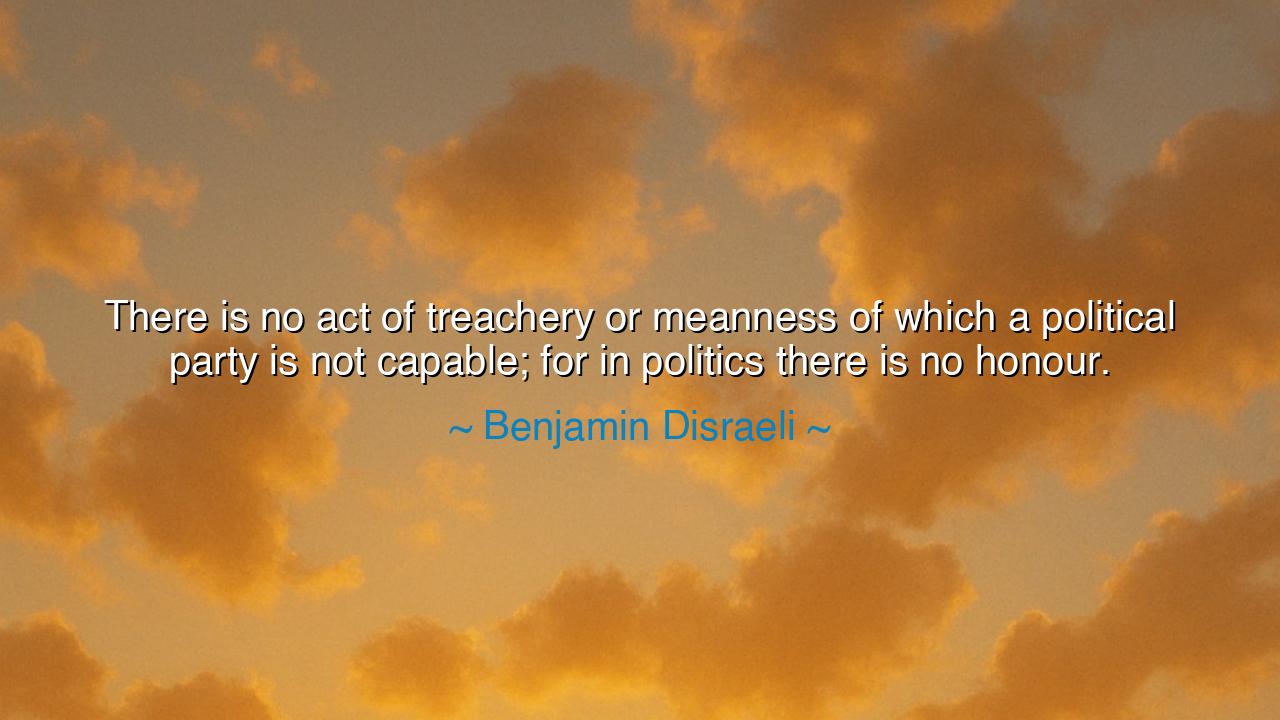
There is no act of treachery or meanness of which a political
There is no act of treachery or meanness of which a political party is not capable; for in politics there is no honour.






The words of Benjamin Disraeli, "There is no act of treachery or meanness of which a political party is not capable; for in politics there is no honour," cut deep like a blade of truth. They reveal the perilous nature of power, and the way ambition can twist men into shapes unworthy of their better selves. In this utterance, Disraeli reminds us that when the thirst for dominance consumes a party, the bonds of integrity dissolve, and every weapon—be it deceit, betrayal, or cruelty—may be unsheathed.
This truth is not bound to his century, but is as ancient as the first councils of men. Recall the tale of Julius Caesar, who trusted the Senate and those he called friends. Yet when ambition’s shadow fell across Rome, daggers were drawn by his own companions. The act was cloaked in the language of patriotism, but it was treachery, born not of love for Rome but of fear and envy. Thus did Rome learn that in the furnace of politics, honour is often sacrificed upon the altar of ambition.
Disraeli, himself a master of parliamentary battles, knew well the meanness of factional strife. He had risen in a world where political parties clawed for supremacy, not with noble contest alone, but with slander, deceit, and intrigue. His words were not cynicism, but recognition: that even in lands of liberty, the spirit of politics is too often a spirit of war, where victory excuses cruelty and honour is a casualty cast aside.
Consider also the age of the French Revolution. The cry for liberty soon dissolved into suspicion, betrayal, and the treachery of the Reign of Terror. Parties who once swore brotherhood sent each other to the guillotine. Those who claimed to defend virtue descended into the deepest meanness, wielding power not as a shield for the people but as a blade against rivals. Here we see most clearly that when honour departs, politics becomes a theatre of blood.
Yet let this not be only lament, but warning and counsel. The wise must walk in politics with eyes unclouded, knowing that parties may betray, leaders may deceive, and ambition may corrupt. To place faith not in faction, but in principle, is the path of endurance. For though honour is scarce in the arena of power, the man or woman who clings to it shall shine all the brighter, like a lone star piercing through a storm of darkness.






-H-Binh HUYNH
Reading this quote made me think about how often we see dishonesty in politics. Could this be an inevitable part of the system, or is it a reflection of a deeper issue in human nature? What are your thoughts on whether honor and integrity can still thrive in such a cutthroat environment, or if they are doomed to be sacrificed in the name of politics?
TTTram T
Disraeli’s quote brings up an uncomfortable thought: could the nature of politics always demand dishonesty to succeed? If so, does this mean that the system itself is flawed, or is it the individuals within it who choose dishonorable tactics? I would love to know what others think—can we truly have politics without betrayal and deceit?
DHdieu huyen
I find Disraeli’s perspective troubling but perhaps somewhat realistic. Do we as voters and citizens expect too much from political parties? Should we resign ourselves to the fact that dishonesty is an inherent part of political life, or do we have a responsibility to demand higher standards of integrity from our leaders? The quote certainly challenges our idealism.
1H16.le hieu
This quote speaks to a troubling reality. Do you think that honor is a quality that’s lost in the competitive nature of politics, or is it simply overlooked for the sake of expediency? It’s hard not to feel disillusioned when reading such statements, but it raises the question: what would it take for politics to regain some form of honor?
Tthanh
Benjamin Disraeli’s statement paints a very negative picture of politics. It makes me question the ethics involved in political maneuvering. Is it possible for any political system to function without a certain level of dishonesty or betrayal? Or is it that power and competition in politics force individuals to act without honor for survival? How do we change this perception?